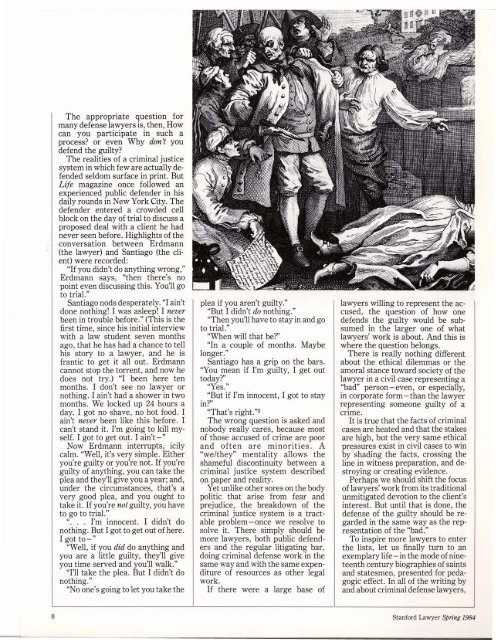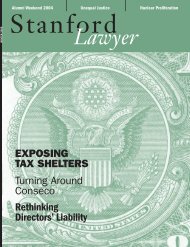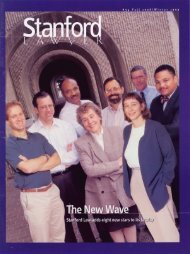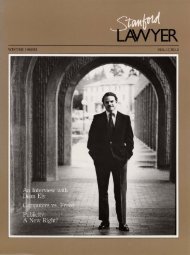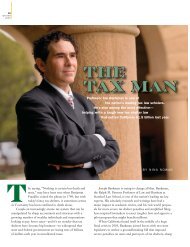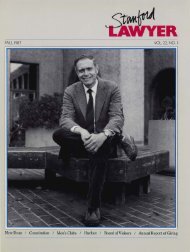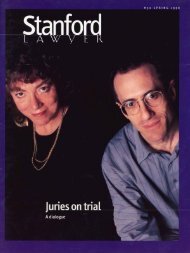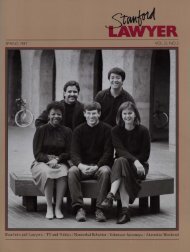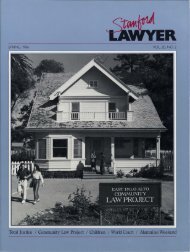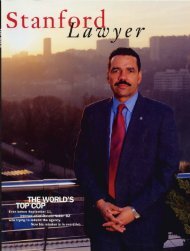Spring 1984 – Issue 31 - Stanford Lawyer - Stanford University
Spring 1984 – Issue 31 - Stanford Lawyer - Stanford University
Spring 1984 – Issue 31 - Stanford Lawyer - Stanford University
- No tags were found...
You also want an ePaper? Increase the reach of your titles
YUMPU automatically turns print PDFs into web optimized ePapers that Google loves.
The appropriate question formany defense lawyers is, then, Howcan you participate in such aprocess? or even Why don't youdefend the guilty?The realities of a criminal justicesystem in which few are actually defendedseldom surface in print. ButLife magazine once followed anexperienced public defender in hisdaily rounds in New York City. Thedefender entered a crowded cellblock on the day of trial to discuss aproposed deal with a client he hadnever seen before. Highlights of theconversation between Erdmann(the lawyer) and Santiago (the client)were recorded:"If you didn't do anything wrong,"Erdmann says, "then there's nopoint even discussing this. You'll goto trial."Santiago nods desperately. "I ain'tdone nothing! I was asleep! I neverbeen in trouble before." (This is thefirst time, since his initial interviewwith a law student seven monthsago, that he has had a chance to tellhis story to a lawyer, and he isfrantic to get it all out. Erdmanncannot stop the torrent, and now hedoes not try.) "I been here tenmonths. I don't see no lawyer ornothing. I ain't had a shower in twomonths. We locked up 24 hours aday. I got no shave, no hot food. Iain't never been like this before. Ican't stand it. I'm going to kill myself.I got to get out. I ain't - "Now Erdmann interrupts, icilycalm. "Well, it's very simple. Eitheryou're guilty or you're not. If you'reguilty of anything, you can take theplea and they'll give you a year; and,under the circumstances, that's avery good plea, and you ought totake it. If you're not guilty, you haveto go to trial."". . . I'm innocent. I didn't donothing. But I got to get out of here.I got to-""Well, if you did do anything andyou are a little guilty, they'll giveyou time served and you'll walk.""I'll take the plea. But I didn't donothing.""No one's going to let you take theIplea if you aren't guilty.""But I didn't do nothing.""Then you'll have to stay in and goto trial.""When will that be?""In a couple of months. Maybelonger."Santiago has a grip on the bars."You mean if I'm guilty, I get outtoday?""Yes.""But if I'm innocent, I got to stayIn.. ?""That's right."2The wrong question is asked andnobody really cares, because mostof those accused of crime are poorand often are minorities. A"we/they" mentality allows theshameful discontinuity between acriminal justice system describedon paper and reality.Yet unlike other sores on the bodypolitic that arise from fear andprejudice, the breakdown of thecriminal justice system is a tractableproblem -once we resolve tosolve it. There simply should bemore lawyers, both public defendersand the regular litigating bar,doing criminal defense work in thesame way and with the same expenditureof resources as other legalwork.If there were a large base oflawyers willing to represent the accused,the question of how onedefends the guilty would be subsumedin the larger one of whatlawyers' work is about. And this iswhere the question belongs.There is really nothing differentabout the ethical dilemmas or theamoral stance toward society of thelawyer in a civil case representing a"bad" person- even, or especially,in corporate form - than the lawyerrepresenting someone guilty of acrime.It is true that the facts of criminalcases are heated and that the stakesare high, but the very same ethicalpressures exist in civil cases to winby shading the facts, crossing theline in witness preparation, and destroyingor creating evidence.Perhaps we should shift the focusof lawyers' work from its traditionalunmitigated devotion to the client'sinterest. But until that is done, thedefense of the guilty should be regardedin the same way as the representationof the "bad."To inspire more lawyers to enterthe lists, let us finally turn to anexemplary life - in the mode of nineteenthcentury biographies of saintsand statesmen, presented for pedagogiceffect. In all of the writing byand about criminal defense lawyers,8<strong>Stanford</strong> <strong>Lawyer</strong> <strong>Spring</strong> <strong>1984</strong>


